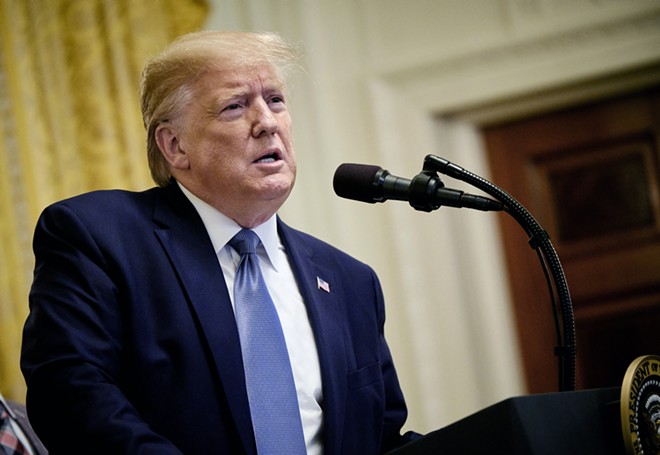
T.J. Kirkpatrick/The New York Times
President Donald Trump speaks at a White House event on Friday, Oct. 4, 2019.
The New York Times Company
WASHINGTON — The Supreme Court on Monday allowed the Trump administration to move forward with plans to deny green cards to immigrants who are thought to be likely to make even occasional and minor use of public benefits like Medicaid, food stamps and housing vouchers.
The vote was 5-4, with the court’s conservative justices in the majority. The court’s brief order gave no reasons for lifting preliminary injunctions that had blocked the new program. Challenges to the program will continue to move forward in courts around the nation.
The administration announced in August that it would revise the so-called public charge rule, which allows officials to deny permanent legal status, also known as a green card, to immigrants who are likely to need public assistance. In the past, only substantial and sustained monetary help or long-term institutionalization counted, and fewer than 1% of applicants were disqualified on public-charge grounds.
The administration’s revised rule broadened the criteria to include “noncash benefits providing for basic needs such as housing or food” used in any 12 months in a 36-month period. Use of two kinds of benefits in a single month counts as two months, and so on.
The new rule was challenged in courts around the country, and five trial judges entered injunctions blocking it.
The Supreme Court considered two cases brought in New York, one by groups that provide services to immigrants and the other by New York, Connecticut, Vermont and New York City. The 2nd U.S. Circuit Court of Appeals, in Manhattan, denied the administration’s request for a stay of two nationwide injunctions issued by a trial judge, and it scheduled arguments in the first week of March.
Justice Neil M. Gorsuch, joined by Justice Clarence Thomas, issued Monday a concurring opinion addressing what they said was the growing problem of nationwide injunctions.
Ghita Schwarz, a lawyer with the Center for Constitutional Rights, which represents groups challenging the new program, said in a statement that “the court’s decision to lift the injunction is very disappointing, but our challenge to the draconian public charge rule is still moving forward.”

